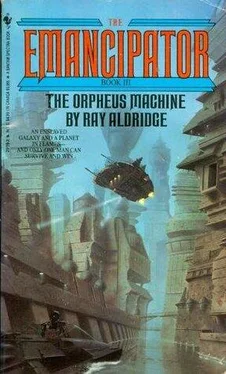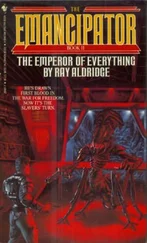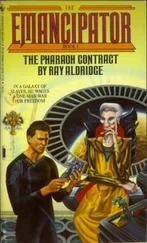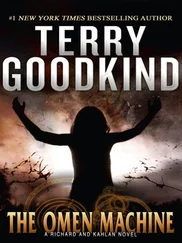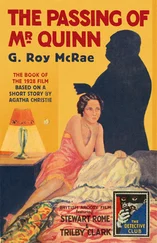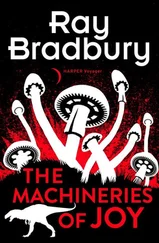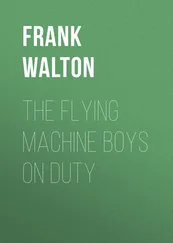It wriggled its torso in the Gencha approximation of a shrug. “Not all of them, or even most of them. The Old Ones’ attention is fixed on Becoming. Nor can they believe in their own mortality; they believe they will live forever as gods. For too long they have hidden here from the human tide that fills the universe; they forget the danger that humans pose to our species. Thus in late years they thought to barter the use of the Machine for power.”
The Gench paused, and its faint breath sighed through its spiracles. “I spent far too much time as the slave of Publius the monster maker; these foolish dreams are not for me, nor will I ever grow to godhood. Survival seems a sufficiently ambitious goal for such a corrupt creature as I. And others find my limitations comfortable. We are a small faction, but determined. Hurry. A guide leads Corean and her bug to the Machine.”
Ruiz toggled his short-range channel again. “Junior? Where are you?” he asked, aware that his voice had acquired a querulous undertone. He got no answer. He waited a few moments longer, then came to a decision. “Let’s go,” he said.
The Gench set off at its awkward-looking rippling gait. At the first branch, it departed from the blood trail.
It was much faster than it looked, and Ruiz was forced to increase his oxygen flow again, to keep up with the creature.
Nisa staggered along, helped by Dolmaero, who seemed to have regained much of his strength down in this constricted Hell.
To either side of the passage were corpses — devolved humans who had tried to prevent them from returning to the tram. Ruiz and the others had gone ahead to do this damage, leaving one soldier to guard the three Pharaohans.
After a few minutes, Ruiz and the soldier called Kroone had returned alone. Kroone had limped and the black armor Ruiz wore was splashed with blood.
Ruiz still maintained his strange distance. The visions, the madness, she thought. That’s why he seems less than himself.
They eventually emerged into the great pit and crossed the sump without incident. Ruiz began to act even more strangely, casting looks back over his shoulder — more looks, Nisa thought, than could be accounted for by caution.
“What is it?” she asked him. But he didn’t reply, and the blank metal of his helmet gave her no clue to his thoughts.
They got onto the tram, and Nisa felt a sort of greedy eagerness to be away from this horrible place. She noticed that she was grinning. So wide was her smile that her face hurt.
Despite her anticipation, some formless misgiving had lodged painfully in her heart. She turned, saw that Ruiz Aw had not boarded the tram yet; his attention was fixed on the red-glowing mouths of the Gencha caverns.
“What is it?” she asked again.
Almost unwillingly, it seemed, his armored head turned toward her. Then he unlatched his faceplate and exposed his face. He was as dangerously beautiful as she remembered — the drug that possessed her only sharpened his beauty, made it both more predatory and more brilliant. He smiled at her with melancholy affection. Still, his black gaze was just a little colder, a little harder than she remembered. Perhaps it’s the drug, she thought.
“Do you know how much I have valued you?” he said, so low that she could barely hear him.
“Yes,” she answered.
“And have you noticed what a great fool I have always been?” He was smiling broadly now. She took no insult at the implication.
“Occasionally,” she answered seriously.
He looked at her as if carving her face carefully in some gallery of the mind. “I will always be grateful for our time together, no matter what happens,” he said, frightening her very badly. “Will you give me a kiss, soft and sweet, from your heart to mine?”
“Yes,” she said.
Ruiz and his guide moved rapidly. They began to pass an occasional semi-human person, who generally stood hastily aside and watched with open mouth as they passed. Down some of the side passages, Ruiz saw living areas, in which people had made pathetically ordinary little nests. In these dwellings, glowpoints gave a brighter light than the red bioluminescence that lighted the tunnels, so that Ruiz could see the few sticks of furniture the inhabitants had lashed together from the sump’s rubbish. The walls were decorated by crude drawings in black and white paint — stick figures with three legs and arms but human heads. Ruiz began to see children, and the youngest of these seemed entirely human. Their wide-eyed faces might have belonged to children anywhere in the pangalac worlds. He refused to think what their lives must be like, down here in the chemical madness of the Gencha enclave.
Abruptly the Gench veered into a side passage. Ruiz followed, to find the creature collapsed behind the concealment of a particularly high rubbish pile.
“What is it?” Ruiz hissed, looking back over his shoulder.
The Gench trembled. “Your enemy has reached the Machine first.”
“How do you know?”
The eyespots regarded Ruiz with an approximation of astonishment. “This information inflames the pheromonic net. Which fills the habitations. How could I not know?”
“How is it that the other Gencha don’t know what you’re doing for me?” Ruiz felt an incipient panic.
“They do know,” said the young Gench. “But what can they do? Our species does not act easily — only such corrupt ones as I can make any sort of individual decision. But now I have no information on which to act — my plan was based on the assumption that you would destroy the Machine before your enemy arrived to kill you.”
“I see,” said Ruiz dubiously. “So, do you also know what has become of my companion?”
“Yes, of course,” said the Gench. “We lost track of him briefly; then he managed somehow to run down a servitor. He forced it to guide him to the place where Corean had left her prisoners and a detachment of her guards. He killed two guards, then negotiated a truce with the survivors. They took the prisoners back to the tramline, killing a large number of our servitors who had attempted to obstruct their escape.”
“Prisoners?” A wild speculation filled Ruiz.
“A woman and two men, shackled into a coffle.”
Nisa. Who else could it be? Junior had acted with Ruiz Aw’s customary ruthless self-interest. Ruiz felt a sudden self-loathing — and a frantic disappointment. Why had he not thought to do the same? He had changed fatally, it seemed.
“Have they left?”
The Gench made its flaccid shrug. “I think not, but I speak with no assurance. The net grows tenuous in the relatively open air of the great pit, and convective currents fragment the data.”
Ruiz felt an almost irresistible impulse to abandon this foolish crusade, to rush back to the pit in the faint hope that Junior had not yet gone, taking Nisa with him. He found himself drawing great shuddering breaths, trembling with anger and grief. No! he told himself. It’s too late. Junior would start up the wall as quickly as he could load the tram, and soon he would reach the sub and be away. With Nisa.
No, only one significant act remained to Ruiz; he could keep faith with Somnire. He could spite Roderigo and all the other monsters of Sook who lusted for the Machine. That would be no small accomplishment, after all. He smiled crookedly.
He forced his attention back to the problem at hand. “Well, all might not be lost. Can you take me to a vantage point? Where I can see and not be seen?”
The Gench thought for a dozen heartbeats. “We can observe the approaches to the Machine, though not the Machine itself. Come. We go by old ways.”
“What were these, then?” Ruiz muttered under his breath, looking at the ancient trash that half-blocked the tunnel. He checked his oxygen level. To his horror, he saw that his reserve was down to fifteen minutes. How had so much time passed? He switched off the flow, so that he would have one more chance to clear his head, should the visions overwhelm him at some crucial point. He took one last breath of clean air, and then opened his armor’s vents.
Читать дальше
